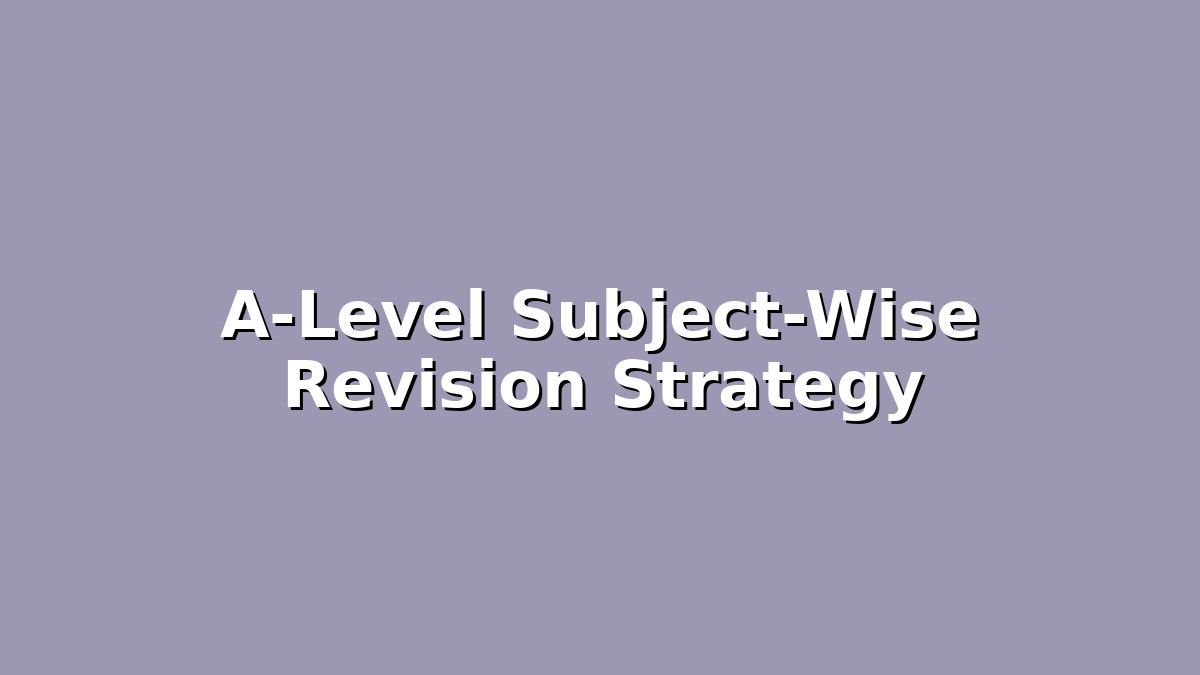Preparing for A-Level exams can feel overwhelming, especially when balancing multiple subjects with different content and assessment styles. However, having a clear, subject-specific revision strategy can make your study sessions more efficient, reduce stress, and ultimately help you achieve the grades you’re aiming for. Whether you’re tackling sciences, humanities, or languages, tailoring your revision approach to each subject’s unique demands is key to success.
In this article, we’ll explore effective revision strategies for three broad categories of A-Level subjects: Sciences (like Biology, Chemistry, Physics), Humanities (such as History, English Literature, Psychology), and Mathematics and Languages. By understanding how to approach each subject with the right techniques, you’ll feel more confident and prepared on exam day.
1. Revision Strategy for Sciences: Focus on Understanding and Practice
Science subjects like Biology, Chemistry, and Physics require a combination of factual knowledge, conceptual understanding, and practical application. Here’s how to revise effectively:
a. Consolidate Core Concepts
Start by reviewing your class notes and textbooks to ensure you have a strong grasp of the fundamental concepts. Use diagrams, flowcharts, and mind maps to visualize processes like the circulatory system in Biology or chemical reactions in Chemistry. Visual aids help break down complex ideas and improve memory retention.
b. Practice Past Papers and Exam Questions
Sciences are heavily exam-focused, so practicing past papers is essential. This helps you become familiar with the exam format, question styles, and time management. When answering questions, make sure you understand why an answer is correct or incorrect. Use mark schemes to guide your self-assessment.
c. Work on Practical Skills
Many science exams include practical or experimental components. If your exams feature this, review your lab notes and experiment reports. Practice writing clear, concise method descriptions and interpreting data. Sometimes, examiners ask you to analyze graphs or predict outcomes based on experimental setups, so honing these skills is critical.
d. Use Flashcards for Terminology and Formulas
Sciences involve a lot of specific terminology and formulas. Creating flashcards (physical or digital apps like Anki) can help you memorize definitions, units, and key calculations. Regularly test yourself to reinforce recall.
2. Revision Strategy for Humanities: Emphasize Critical Thinking and Essay Practice
Subjects like History, English Literature, and Psychology require you to analyze information, form arguments, and express ideas clearly. Here’s how to optimize your revision:
a. Create Detailed Notes and Summaries
Start by organizing your notes into clear, thematic sections. For History, you might divide your notes by time period or event; for English Literature, by text or theme. Summarize key points in your own words to deepen understanding and identify gaps in knowledge.
b. Practice Writing Essays and Structured Answers
Humanities exams often ask for essay-style responses. Practice planning and writing essays under timed conditions. Focus on structuring your essays with a clear introduction, coherent arguments supported by evidence, and a strong conclusion. Reviewing model essays and examiner reports can give you insight into what markers are looking for.
c. Engage in Active Reading and Critical Analysis
For subjects like English Literature and Psychology, critical analysis is vital. Engage with your texts by annotating key passages, questioning authors’ intentions, and comparing different interpretations. Discussing ideas with peers or teachers can also enhance your analytical skills.
d. Use Mnemonics and Timelines
In History, timelines help you place events in context and understand cause-effect relationships. Mnemonics are helpful for remembering dates, theories, or psychological models. These memory aids can simplify complex information, making recall easier during exams.
3. Revision Strategy for Mathematics and Languages: Build Routine and Practice Consistency
Mathematics and language subjects (like French, Spanish, or German) heavily rely on skill development and regular practice.
a. Mathematics: Practice, Practice, Practice
Math demands continual problem-solving practice to master concepts and techniques.
– Understand the Foundations: Ensure you know basic formulae, algebraic rules, and theorems inside out. Without a strong foundation, complex problems become difficult.
– Work Through Past Papers: Regularly attempt past exam questions, focusing on areas where you struggle. Review your mistakes carefully and understand how to correct them.
– Use Step-by-Step Solutions: If you get stuck, study worked solutions to see the logical steps, then try similar problems independently.
– Attend Revision Sessions: If possible, participate in extra classes or online tutorials to clarify doubts.
b. Languages: Immerse and Practice Actively
Language learning is about exposure and active use.
– Expand Vocabulary Daily: Use flashcards or language apps (like Duolingo or Memrise) to learn new words and phrases regularly.
– Practice Speaking and Listening: Engage in conversation practice with classmates, teachers, or language partners. Listen to podcasts, watch films, or use language learning videos to improve comprehension.
– Revise Grammar Systematically: Break down grammar rules and practice exercises to avoid common mistakes.
– Write and Review: Write essays, letters, or summaries in the target language and get feedback if you can.
c. Develop a Consistent Study Routine
Both Maths and Languages benefit from daily practice rather than last-minute cramming. Set aside short, regular study sessions focused on different skills—problem-solving for Maths, vocabulary and grammar for Languages. Consistency helps build fluency and confidence.
—
Conclusion
Successfully revising for your A-Level exams means more than just putting in hours—it’s about working smart, using strategies tailored to each subject’s unique requirements. For science subjects, prioritize understanding concepts and practicing exam questions; for humanities, focus on critical thinking and essay writing; for mathematics and languages, build consistent practice routines that develop your skills gradually.
Remember, revision is a journey. Be patient with yourself and celebrate small victories along the way. Use these subject-wise strategies to guide your study plan, and you’ll be well on your way to achieving the results you want. Believe in your ability to succeed—you’ve got this!

Responses